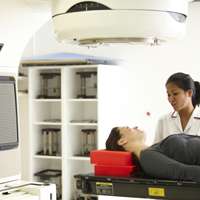Study confirms fewer, bigger doses of radiotherapy benefit breast cancer patients

A lower total dose of radiotherapy, delivered in fewer, larger treatments, is as safe and effective at treating early breast cancer as the international standard dose, according to the 10-year follow-up results of a major Cancer Research UK trial presented at the 2012 CTRC-AACR San Antonio Breast Cancer Symposium today (Thursday).
Nearly 4,500 women across the UK have taken part in the START trials, which were co-ordinated by the Clinical Trials and Statistics Unit at The Institute of Cancer Research, London, and funded by Cancer Research UK, the Medical Research Council and the Department of Health.
The initial five-year results showed it was just as effective and safe to give women a lower total dose of radiotherapy in fewer, larger treatments than the 25-dose international standard. The new treatment routine also offered important benefits for women, including fewer trips to hospital, as well as cost savings for the health service.
As a result, the shorter treatment course of 15 treatments was adopted in the UK in 2008, but the longer course is still used in many other countries.
This latest 10-year follow-up, funded by Cancer Research UK, confirms these benefits and shows that very few women (around six per cent) experience a relapse of cancer within the same breast, regardless of whether or not they have a shorter course of radiotherapy after surgery.
Chief investigator Professor John Yarnold, professor of clinical oncology at The Institute of Cancer Research (ICR) and honorary consultant at The Royal Marsden NHS Foundation Trust, said: "We have shown conclusively that less can be more in breast cancer radiotherapy. Three weeks of radiotherapy is as good as five weeks – as well as being more convenient and less tiring for patients and cheaper for the health service.
"The risk of breast cancer recurring continues beyond five years, and side-effects of radiotherapy can often develop many years after treatment, so these long-term results provide a very important reassurance that the shorter treatment course is definitely the best option for patients. Some doctors may have been hesitant to change their practice on the basis of five-year results, but these long-term findings should convert those sceptics."
The same team is now setting out to investigate whether even fewer doses of radiotherapy could be just as effective, as part of a new Phase III randomised controlled trial of 4,000 women called FAST-FORWARD. The trial will compare the new standard 15-dose course of radiotherapy treatment, delivered over three weeks, with an even shorter five-dose course, delivered over one week.
Jo Haviland, a senior statistician at the ICR, added: "The START trial has had a huge impact on changing the standard of care for women with breast cancer in the UK, and increasingly around the world. Recruitment is already underway for the new FAST-FORWARD trial we are co-ordinating, to see if we can further improve treatment and spare both women and the health system the burden of extra treatments."
Kate Law, Cancer Research UK's director of clinical research, said: "What's really exciting is that, as a result of this trial, women are already benefiting from the added physical and emotional wellbeing of needing fewer hospital visits for their treatment. Minimising the long-term side effects of treatment is becoming increasingly important as cancer patients live longer. We hope that women around the world will now be able to benefit from this improved standard of care."















